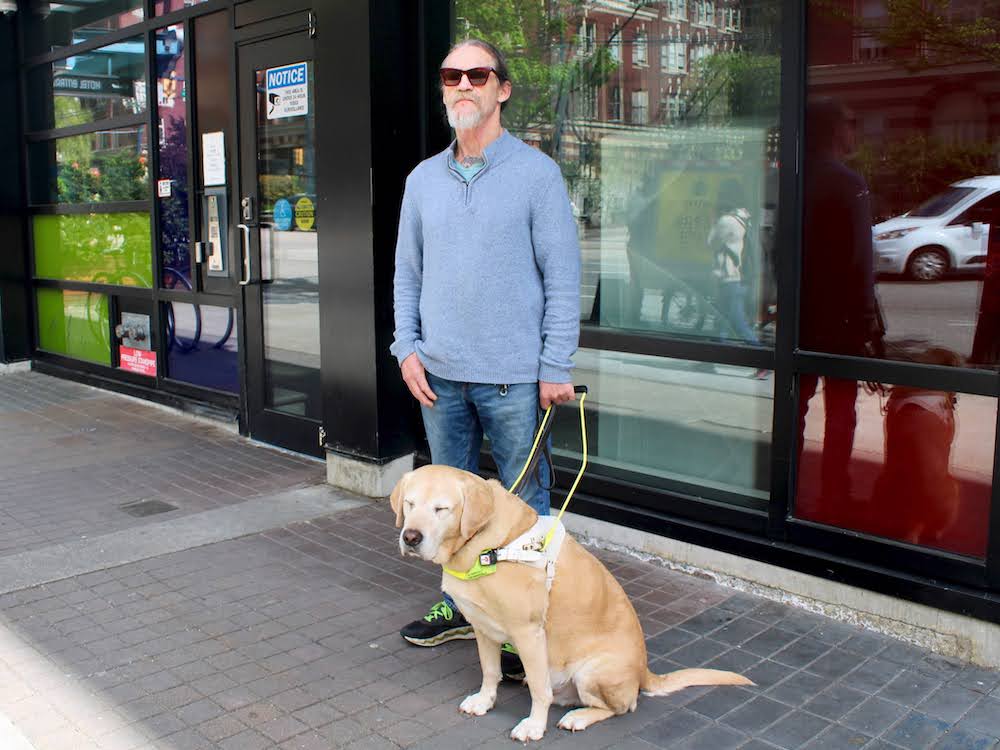Some supportive-housing tenants who won hard-fought court challenges for the right to have visitors without time limits have now lost that right thanks to B.C. government action.
The government exempted the tenants from portions of the province’s rental housing law.
Kelly Dorscheid-Harmon said he learned of the change on May 1 when building staff told him a guest would have to show identification before they could enter the building.
Dorscheid-Harmon had previously negotiated an agreement with his landlord allowing people to visit without showing identification after several neighbours won Residential Tenancy Branch hearings that ruled their landlord’s visitor restrictions violated the Residential Tenancy Act. Those restrictions included limiting overnight visits to 14 nights per year and a requirement that guests show ID.
“The thing is, they separate us from our families. Fourteen overnights a year — it’s bullshit,” said Dorscheid-Harmon, who is partially blind and said he couldn’t read a notice that had been put on tenants’ doors about the legal change.
“When I was allowed to have guests, I was able to take care of myself better. They cook for me, they help me clean up, because I really can’t see. If my place is dirty, I don’t even know it.”
The B.C. government and supportive-housing providers say the changes were necessary to keep supportive-housing buildings safe.
Supportive-housing tenants are now exempted from the portion of the Residential Tenancy Act that protects their right to quiet enjoyment of their home, a change the government and landlords say was necessary to be able to restrict visitors, require guests to show identification and do wellness checks.
“In order to operate supportive housing safely, what we’ve heard from supportive-housing providers is that they’re either at odds with the [Residential Tenancy Act] or they’re at odds with their requirements under the Workers Compensation Act and occupational health and safety standards,” said Jill Atkey, CEO of the BC Non-Profit Housing Association.
Some supportive-housing providers back the changes and some say they don’t go far enough and they still can’t manage health and safety concerns in their buildings.
Atkey said that when the tenancy act is applied to supportive housing, the only option to deal with tenants is eviction — something providers are trying to avoid. (The Tyee has previously reported on advocates’ concerns that evictions from supportive housing are frequent and there is not enough information about the number and cause of evictions.)
But tenants and rental law advocates say they’ve been taken aback by the extent of the changes. They’re concerned the change to B.C.’s rent law has left low-income and disabled residents with fewer legal protections than other renters in the province.
Shawna Di Guistini, a supportive-housing resident who lives in the same building as Dorscheid-Harmon, organized a tenants’ meeting to discuss the changes. She said her neighbours asked, “‘Were tenants consulted? Why didn’t we know about this? Why weren’t we consulted, what can we do about this?’”
“And from what I can see: nothing. It’s a done deal.”
In response to questions from The Tyee, staff at the Ministry of Housing said the legislation changes had been made based on “prior engagement” with housing providers and tenants, but did not provide any details on the consultation process.
In a press release about the changes, landlords are quoted, but there are no quotes from tenants.
Robert Patterson, a lawyer who works at the Tenant Resource and Advisory Centre in Vancouver, said the Residential Tenancy Act could have been rewritten to allow wellness checks and restrict visitors in a way that doesn’t remove existing rights.
But he said the way the law has been changed is an overreach by the B.C. government that gives too much power to landlords.
“Now, tenants in this kind of housing have no right to quiet enjoyment, which means that they have no right to recourse if the landlord’s harassing them or another tenant’s harassing them and the landlord won’t do anything about it,” Patterson said.
“They have no right to deny the landlord entry.”
Patterson said the government should instead be looking at whether supportive-housing providers have enough funding to be able to adequately staff their buildings, and whether tenants are getting the right supports.
Supportive housing is designed to help tenants who are at risk of homelessness or have been homeless in the past stay housed. Some supportive-housing tenants have ongoing medical conditions, including addiction, and many live with disabilities. All are low-income.
Tenants in the buildings are supposed to be connected with support workers, meal programs or other assistance to help them stay healthy and housed.
For years, supportive-housing providers have tried to keep their buildings safe from violence by restricting guests and controlling who comes in and out of the building. Many supportive-housing landlords also do wellness checks to check whether tenants have overdosed or need to be reported as missing to police.
But all of those policies contravened the Residential Tenancy Act. In multiple Residential Tenancy Branch hearings and court cases, arbitrators and judges have ruled that the act does apply to supportive housing. The tenants who mounted those challenges won the right to have visitors and a key to the front door of their buildings.
The B.C. government confirmed that removing the right to quiet enjoyment means that previous court judgments and RTB decisions no longer apply when it comes to guest policies, although tenants will be able to continue to keep their front door keys.
Karol Decker lives in a supportive-housing building and has a full-time job working in another supportive-housing building. She said it’s common for supportive-housing workers to enter residents’ rooms when they’re not home. Di Guistini said she has also seen staff enter her neighbours’ rooms when they’re not at home and has asked staff at her building not to conduct wellness checks on her.
“Prior to this change, I had submitted a form and said I didn’t need this, but I still had staff come to my door and try to do wellness checks,” Di Guistini said, adding that some of her neighbours do want to get wellness checks.
The Tyee asked the Housing Ministry whether there are any guidelines for how wellness checks must be conducted under the new legislation and was told those guidelines are currently being worked out with supportive-housing providers.
Some tenants of supportive housing have complex medical needs, addiction issues or mental health issues. But other residents live in the buildings because they can’t afford to live elsewhere, and say all they want or need is normal rental housing.
“I don’t do drugs. I don’t drink. I go to work every day. I just don’t make enough money to live,” said Decker.
“And they’ve just made it so they can do whatever they want.”
Dorscheid-Harmon said he doesn’t consider himself a supportive-housing tenant, because he doesn’t receive or want any supports from his landlord. But under the B.C. government’s definition, people who live in supportive-housing buildings don’t need to be receiving the supports to be considered supportive-housing tenants.
The Tenant Resource and Advisory Centre’s Patterson has concerns about the vague definition of supportive housing. Under the current rules, he said, any operator of social housing or non-market rental housing could define themselves as a supportive-housing provider “simply by having one staff member in your building run a monthly bingo night.”
Housing Ministry staff told The Tyee that supportive-housing providers must be charitable organizations or government agencies. To be considered supportive housing, the residential property must be run by a supportive-housing operator and the unit must be occupied by a tenant “who is assessed as experiencing or at risk of homelessness and would benefit from housing stability support.” The ministry did not respond to a question about whether tenants can ever have that assessment re-evaluated.
If tenants are concerned about how staff are carrying out the supportive-housing provider’s policies, they can complain to BC Housing. But that agency is also the main funder of supportive housing in the province, and there is no third-party ombudsperson or regulator for supportive housing.
Di Guistini said the government’s changes to remove some of her rights as a tenant have made it clear to her that she needs to find a way to move out of supportive housing.
“People who are already severely disadvantaged, you’ve just wiped away their rights without a second thought,” she said. ![]()
Read more: Rights + Justice, BC Politics, Housing

















Tyee Commenting Guidelines
Comments that violate guidelines risk being deleted, and violations may result in a temporary or permanent user ban. Maintain the spirit of good conversation to stay in the discussion and be patient with moderators. Comments are reviewed regularly but not in real time.
Do:
Do not: